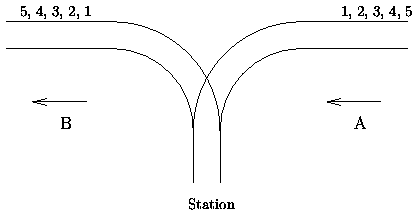| Time Limit: 1000MS | Memory Limit: 10000K | |
| Total Submissions: 18531 | Accepted: 7391 |
Description

The local tradition is that every train arriving from the direction A continues in the direction B with coaches reorganized in some way. Assume that the train arriving from the direction A has N <= 1000 coaches numbered in increasing order 1, 2, ..., N. The chief for train reorganizations must know whether it is possible to marshal coaches continuing in the direction B so that their order will be a1, a2, ..., aN. Help him and write a program that decides whether it is possible to get the required order of coaches. You can assume that single coaches can be disconnected from the train before they enter the station and that they can move themselves until they are on the track in the direction B. You can also suppose that at any time there can be located as many coaches as necessary in the station. But once a coach has entered the station it cannot return to the track in the direction A and also once it has left the station in the direction B it cannot return back to the station.
Input
The last block consists of just one line containing 0.
Output
Sample Input
5 1 2 3 4 5 5 4 1 2 3 0 6 6 5 4 3 2 1 0 0
Sample Output
Yes No Yes
Source
//这么晚写代码、写的比较乱、思路有些模糊呀、呵呵、栈的简单应用
#include <iostream>
#include <stdio.h>
#include <string.h>
#include <queue>
#include <stack>
#include <vector>
#include <algorithm>
using namespace std;
int main()
{
int n,k,i,t;
while(scanf("%d",&n),n)
{
while(scanf("%d",&t),t)
{
stack<int> S;
k=1;
S.push(k);
while(S.top()!=t)
{ k++;
S.push(k);
}
S.pop();
for(i=1;i<n;i++)
{
scanf("%d",&t);
if(S.empty()) k++,S.push(k);
while(S.top()!=t)
{ k++;
if(k<=n)
S.push(k);
else
break;
}
if(k<=n)
S.pop();
}
if(!S.empty())
printf("No\n");
else
printf("Yes\n");
}
printf("\n");
}
return 0;
}